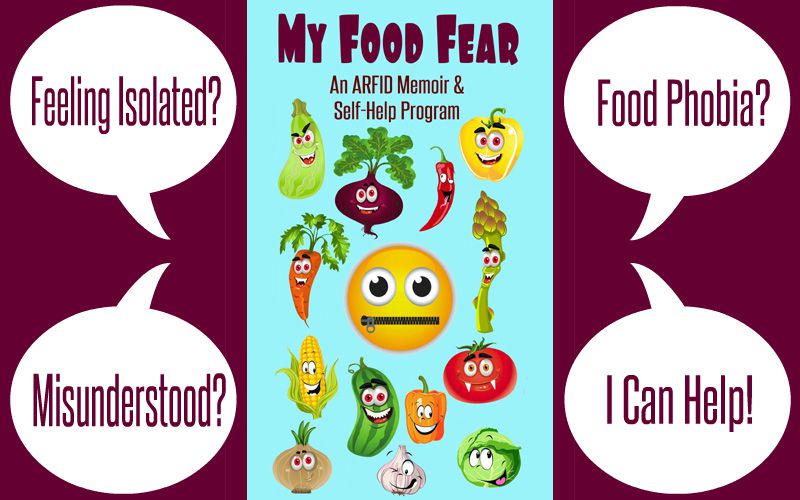Fear of eating at restaurants can be an independent phobia, but is often a commonly observed expression of avoidant restrictive food intake disorder (ARFID). Restaurant meals are one of life’s great joys for most people, but for individuals with a phobia of dining out, the idea is actually nightmarish! I definitely held a great fear of dining out when I was suffering from ARFID, since there was usually little, if anything, I could eat, which always led to a very uncomfortable time for all involved.
Why would a person be frightened by eating at a restaurant? How can one determine if this is a separate phobia or part of a larger fear and potentially a more serious eating disorder? Is there any way to get more comfortable dining out? These are all common questions that I receive often and each is well worthy of careful consideration.
This post explores restaurant phobia in many of its expressions. If you are affected by a fear of dining out, then this is the ideal post for you. Please feel welcome here! We are a community of people who understand exactly what you are going through when it comes to extremely selective eating habits…
Variations of Restaurant Phobia
Let’s detail the 2 primary specific types of fear involving eating at restaurants:
Some people eat normally and do not have a restrictive diet at all. These people DO NOT suffer from any eating disorder, despite refusing to eat at a restaurant. Most of these people are fearful of hygiene issues, distrustful of strangers preparing their food or have other case-specific reasons for their fear. The overwhelming majority of these people will be sure of WHY they are fearful and typically can overcome this fear (if they choose) quite easily.
Others suffer from ARFID and are highly selective eaters. These people most often do not have a fear of restaurants, per se, but instead fear the circumstances that are presented by dining out… They typically only eat very limited types of foods and this can be very challenging when dining out. Furthermore, the psychological impact of constantly feeling different than everyone else and the isolation this creates are extremely uncomfortable. Social impact of this fear makes people with food fears even less likely to eat communally. On occasions when a fearful person does agree to eat with friends, family or colleagues at a restaurant, the fearful person suffers, the companions suffer and the staff suffer, all from different types of discomfort. It is never a good experience for anyone…

Consequences of Fear of Eating at Restaurants
When a person refuses to dine out, or does so begrudgingly, they can suffer in many ways. Additionally, people around them can also suffer, which makes the food phobic person feel even worse:
People with serious restaurant phobias often avoid traveling. Many people do not like to stray far from home so that they can attend to their own eating needs in private. When and if they do travel, they choose “safe” destinations where they know food will be readily available to them. Being that travel is such an amazing part of a full life and a great tool for personal development, this is a terrible consequence that is difficult to measure fully.
Fearful people might refuse chances to connect with friends, family and business connections when eating is involved (virtually always). This can lead to lost relationships, missed opportunities and even have detrimental effects on career and love prospects.
People with restaurant phobia tend to make others very uncomfortable when they do dine out. They feel isolated, different, alone and bad about the way others might react to them when they refuse to eat. Companions will feel uncomfortable and staff at the restaurant will often also feel and act awkwardly.
Can I Overcome My Fear of Eating at Restaurants?
In short form, Yes! Yes, you can… I did. Restaurants were my worst nightmare for the many years I suffered from ARFID (age 2 to age 37 approximately). I did try to go out to eat with friends and family, but it was never a good experience. Most of the time, there was little for me to eat and sometimes, there was literally NOTHING I could eat. It was very awkward…
I was very fortunate in that the people in my life never made me feel really bad about my strange eating habits. This led to me growing up strong, confident and very capable, becoming successful in all that I did in life. However, this acceptance also facilitated my continuing poor eating habits that were objectively a source of suffering for all, including me, for decades. Therefore, I guess my support base was a mixed blessing… I talk more about my selective eating disorder in the My Story section and also go into vivid and humorous detail in my book My Food Fear. If you are looking for inspiration and answers, you will definitely love the book!
There are many ways to overcome a fear of eating at restaurants. For people who eat normally otherwise, it is really just making the decision to change and then implementing cognitive behavioral modifications that facilitate that change. Since there is no eating disorder involved, most people can overcome their restarant phobia and learn to enjoy the world of fine dining out of the home.
For people who do suffer from ARFID, things get much more complicated. In almost every case, the eating disorder can be improved or even resolved, but this needs to be accomplished as a priority. If a person can succeed, their fear of dining out will almost always assuage organically. Therefore, I do not recommend that people who suffer from ARFID should focus on dining out more. Instead, if they want to change, they should find help for their overall picky eating habits or choose to follow a self-help program.
As a person who has recovered from a very serious eating disorder, I can tell you for sure that life IS much better when you can eat normally and enjoy restaurant dining! It has opened up a new world for me later in life and I am VERY HAPPY with the change!
